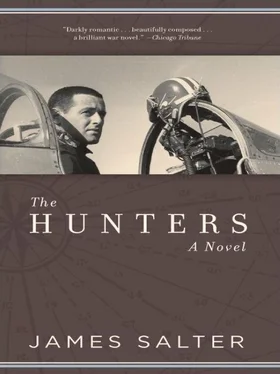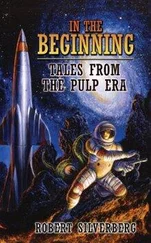The bar at the Fifth Air Force club had been some sort of shrine. On three sides were double doors adjoining each other, which served instead of walls, but these were opened only in warm weather. The wood was carved ornately and gilded. Mirrors multiplied the effect. It was like sitting in a huge jewel box, and there was a large crowd in a variety of uniforms. They ordered champagne. Outside, the rain began to fall.
“Listen to that.”
It sounded like a sheet of water waving before the wind. The gusts were as clear as if they could be seen.
“Come to Japan, Jim,” Cleve said. “The weather won’t be any good here.”
“Pour me some more champagne.”
“I’ll pour you all you want. How would you like a bath in champagne in Tokyo?”
“It’s not high on my list. Sounds more like Bert.”
“Come on with us in the morning. We’ll have a time.”
“The weather may break. I only have nineteen missions to go. I want to finish up. Besides, I’m married.”
“Not in Tokyo.”
“I can’t go, Cleve.”
“Have some more champagne.”
They drank a second bottle. The rain had begun to abate. There was only the thin sound of it, like a hiss, and through that the musical, heavy drops falling from the roof. At the next table someone was complaining about how tough the briefing for General Breck had been that day. The general had been in an ugly mood. He had not even bothered to light his cigar.
“Cleve!”
It was Abbott, calling as he edged through the tables toward them. He was followed by another major. They came up to the table.
“How have you been?” he asked, smiling.
“Fine. What about you?”
“This is purgatory,” Abbott said. “I stoke fires with paper all day long.”
He introduced the major who stood beside him.
“This is Ben Gross. He works with me in this pest hole.” They sat down. “Well, you got yourself a MIG, Cleve, didn’t you?” Abbott said.
It was nice to hear somebody saying that. Cleve nodded.
“That’s the hardest one, that first one,” Abbott continued.
“Can you guarantee that?”
“That’s what they say. How did it happen?”
“Oh…” Cleve began.
How did it happen? Abbott had asked. What did it matter to him now, but he had to know. His heart was still far away from here, wedged in the cockpit, waiting to go north again. His heart was beating like a fish in a net, miles up in the thin air over Sinuiju. Abbott made no pretense of being at home in these surroundings. He sat awkwardly in his chair, as if perched, like a caged wild bird. His friend, the other major, he seemed to have forgotten in a moment. He was with old comrades now. Everybody else was a stranger. Everything else fell away like cloth before fire.
“How did it happen, Cleve?”
“He just got in my way.”
“No, really.”
He had to know. It was news from what had been home, and he was famished for it, like an exile. He was a man lost, afloat on foreign tides. He could never return, nor would he find peace where he was. There was nothing he could do but exist on memories and seize upon an old friend passing, with the grip of a dying man.
It was painful to see. Cleve felt it in his stomach like an iron egg. It was like watching a man hanged. He could feel the rope about his own neck, his own hands lashed, his knees gone. It could be happening to him too easily, to anybody who loved too fiercely or was true to what he believed. He could see himself in Abbott’s place, sitting across the table, devouring the crumbs he was lucky enough to find. He did not want to look, but the compunction was as strong as that of taking a last glance at the wax face of a friend lying in state. Perhaps that was why they all hated Abbott, Cleve thought, because they saw themselves.
He could not get away from it, even for an hour. There was a way to live and a way to die. He was supposed to show them that. It was what you had to demonstrate to be a leader. At moments like this he was certain that he was miscast. He did not have enough to give. He did not love men enough.
If he did have a failing, it was excessive lucidity, which can be the same as blindness. He should have been aware. DeLeo was proud, but not beyond yielding. He would have crawled for Cleve. Daughters was afraid, but he would have concealed it. The leader does not know he is their saint. He does not hear what they say about him. He feels his loneliness and does not recognize its meaning. He looks forward and does not see them following. He falls and does not know they have triumphed.
“…heavily outnumbered by enemy fighters,” Daughters was saying, improvising a citation for Cleve’s story, “through curtains of flak, and the most adverse weather conditions, in the highest traditions of the United States Air Force.”
“All pilots will report to wing headquarters,” DeLeo added, “to receive medals. If you have one, draw one. If you have two, turn one in.”
They had another bottle of champagne after the majors left. By the time they were ready to eat, it was too late. The kitchen had closed. It was a fine evening despite that. They drove home after midnight, through a dark, exhausted city and along empty roads, singing most of the way. It had stopped raining. The night was cool and mild. The moon shone through thin clouds that looked like a layer of wet newspaper.
“Tokyo tonight,” DeLeo grinned.
“Tomorrow night, you mean.”
“This is tomorrow.”
It was drizzling again in the morning when they flew out on a transport. The ride was instruments all the way, nothing but sound and no movement, as traveling through sheer space in the register of absolute zero must be. Finally, they let down and landed at Tsuiki in southern Japan, just before noon. From there they took the train north.
It was an old car with worn plush upholstery on seats that released sudden puffs of dust when disturbed. Along the center of the ceiling ran a line of etched, opaque globes that cupped the bulbs; and all the fittings were yellow brass. Cleve settled back to watch through the water-rippled window the first hour or so of countryside. It was turning green beneath the wet, warming skies. The orange trees were dotted with fruit, cabbages were up, and the tea bushes gleaming. Only the rice stubble in the quilted, reflecting fields still appeared dormant. In the stations, vendors displayed slopes of candy, oranges, beer, and cigarettes on their stands.
He sat enjoying the gentle swaying of the car and a symphony of nostalgic sounds: the groaning of the axles, the subdued shriek of metal bindings, the iron clatter of the vestibules. They were traveling. They were fleeing, leaving the war behind. He had forgotten what it felt like to be going somewhere by train. The satisfaction was as substantial as a liquid within him. He listened to the wheels pounding and watched the occasional flurries of clotted smoke that came back from the engine. He felt part of the country itself. There seemed nothing strange here, rather it was all very familiar and comfortable to him.
DeLeo opened his musette bag. He had a fifth of bourbon in it, and cans of shrimp and other food. They did not drink the bourbon. Instead, they bought Japanese beer in quart bottles at the stops, opened the shrimp and ate and talked. The afternoon went pleasantly that way, thinking back to other journeys and days, to what had happened and what was to come. DeLeo was a good companion. He had always traveled. He was at rest while moving, and less military than ever. They fell asleep before dark, leaning on their elbows on the window sills. The porter had to wake them up to make the berths.
Cleve stepped outside at one stop just before he went to bed. It was a damp night, but calm and clean-smelling. The country air nourished his whole body. He strolled down the concrete platform alongside the quiet, sleeping cars. After a while he reached the end of the overhead shed and, still further on, the head of the train. A stocky engine stood there in chaplets of steam and vapors. The signalman bowed politely toward him. Cleve remained for a few minutes of uncertainty, expecting to see the train budge to a start at any time. Then he walked back slowly. The sky above him was curdled gray.
Читать дальше












